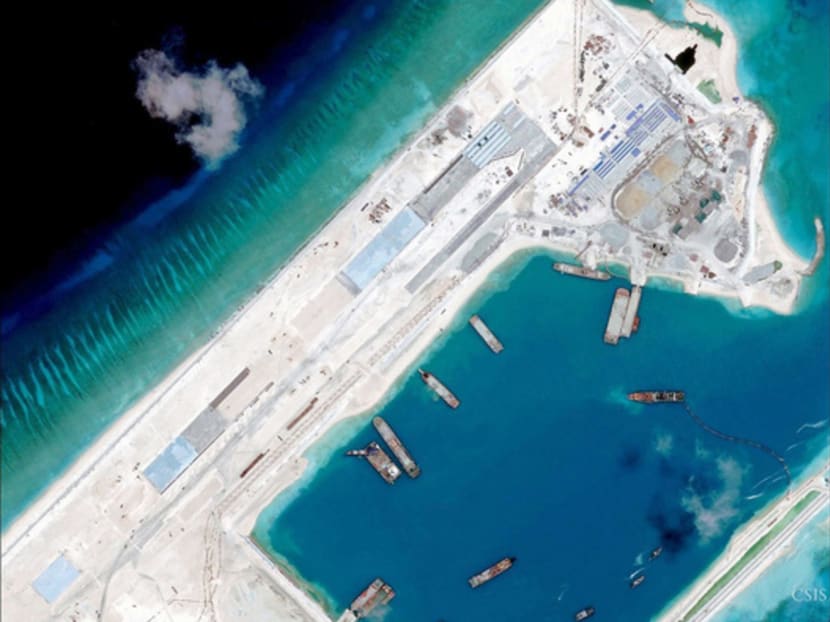Building programme ‘giving China control of vital routes’
WASHINGTON — China’s island building programme in the South China Sea may result in it gaining control of some of the world’s most important waterways, the United States’ most senior military commander for Asia said.

Airstrip construction on the Fiery Cross Reef in the South China Sea in a satellite image on April 2. Photo: Reuters
WASHINGTON — China’s island building programme in the South China Sea may result in it gaining control of some of the world’s most important waterways, the United States’ most senior military commander for Asia said.
“If this activity continues at pace — those would give them de facto control” of the maritime territory they claim, Admiral Samuel Locklear, head of the US Pacific Command, told the US Senate.
Adm Locklear said China could install long-range radar and base warships and planes on the islands, potentially giving it the ability to enforce an air defence identification zone.
Recent satellite images show China has made rapid progress in building an airstrip suitable for military use in contested territory in the Spratly Islands and may be planning another, moves that have been greeted with concern in the United States and Asia.
President Barack Obama said last week the US is concerned that China is using its “muscle and power” to dominate smaller countries in the region.
Adm Locklear said the pace of China’s building programme was “astonishing” and added that the islands would improve China’s ability to locate a maritime security force in the waters that would be larger than the combined coast guards of the Southeast Asian countries.
China claims about four-fifths of the South China Sea, home to some of the world’s busiest shipping lanes, under a so-called nine-dash line drawn on a 1940s map. Vietnam, the Philippines, Taiwan, Malaysia and Brunei also claim territory in the waters.
Philippine President Benigno Aquino said yesterday the territorial dispute with China in the South China Sea was of concern for the world because global trade will be hit by China’s reclamation.
“We keep asserting the problem in the South China Sea is not a regional problem,” Mr Aquino told journalists. “This is a problem of the whole world because 40 percent of global trade pass through these waters. Global leaders have already expressed their concern on this problem.”
China says it has a right to carry out construction work on its sovereign territory in the South China Sea.
“It certainly complicates the security environment,” said Adm Locklear. Efforts by the Association of Southeast Asian Nations to work with China to develop a code of conduct in the South China Sea haven’t “produced very much at all.”
Adm Locklear said the US has reinvigorated its alliance with the Philippines and is looking at helping its government improve its minimum defence. American and Filipino troops will take part in the largest-ever drills in 15 years next week, a key component of America’s rebalance to Asia policy.
To help improve security in the region, the US had also developed partnerships with nations that it wouldn’t have considered possible over the past two decades, he said, citing Vietnam, Malaysia and Indonesia.
Locklear said the increasing number and technical sophistication of the submarines in the Indo-Pacific was changing the dynamic of how the US navy operates in the area. He estimated that of the 300 submarines in the world that aren’t U.S. vessels, 200 are in the Indo-Pacific, which he said was the “most militarised part of the world.”
Adm Locklear said Asian nations are building their submarine capabilities because they understand the vessels afford them the ability to deny access to enemies, as well as their value as a deterrent.
Conflict with China isn’t inevitable, he said.
“A China with a military that would come forward as a net provider of security, rather than a net user of security would be beneficial to not only the region, but would be beneficial to us,” he said. AGENCIES









